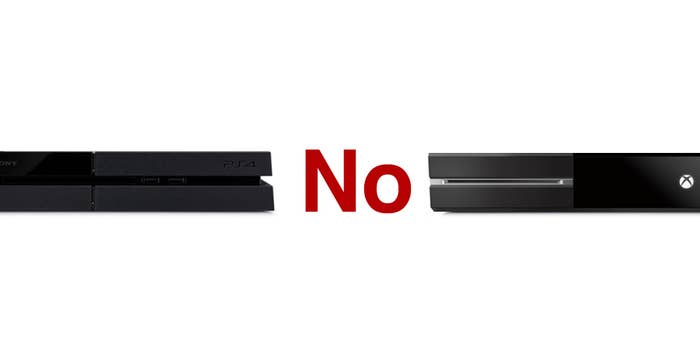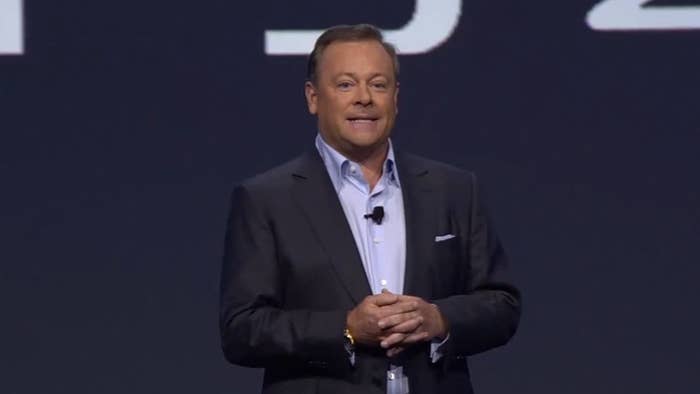
In 1992, at the height of the 16-bit console generation, a marketing team at Sony conducted a series of focus groups on gamers. They revealed something surprising: Teenage boys who owned a Super Nintendo would not admit it in public. The reason? The other dominant console of the era, the Sega Genesis, with its extreme mascot Sonic and uncensored version of Mortal Kombat, had tapped so keenly into teenage male culture that it had made Nintendo, with its G-rated games and chubby plumbers, uncool.
Can you imagine anyone in this day and age actually lying about their console preference? The so-called "console wars," which once led to actual public dissembling, are now regarded, beyond the fringes of fan-site forums and enthusiast subreddits, as a thing of the past. Why?

It was hard for even the fanboys to pick sides in the most recent edition of the "console war." First of all, Nintendo easily won it by the numbers, selling 20 million more copies of the Wii than Microsoft or Sony sold of the Xbox 360 or PlayStation 3. But, of course, the casual-gaming Wii had few fanboys. Also, a dwindling number of exclusives meant that aside from a few big franchises the systems basically played the same games. Early in this generation Sony and some supporters pointed to the PlayStation 3's technological superiority as a reason it would host games with much better visual fidelity. As it turned out, many other factors proved more important: which system a game was originally developed for, which engine it used, how familiar a developer was with the hardware. In other words, in most cases, it came down to the individual game; everyone was wrong. So graphics, the traditional redoubt of the console warrior, were hardly a bragging point. You might have a 360 because you like its interface better, or a PlayStation because you like its Blu-ray player, but neither feature is really the stuff of vitriolic discourse.
The Sony press conference at E3 last night was the strongest public expression of console partisanship I have seen in years. When Jack Tretton, president and CEO of Sony Computer Entertainment America, announced that the PS4 would support the free sale and trade of used games on the PlayStation 4, the assembled crowd literally started chanting "Sony." They chanted "Sony"! Sony is the 13th-largest company in Japan. To grasp just how absolutely strange a cultural phenomenon this was, imagine a crowd of fanatics and writers in Osaka (the second-largest city in Japan) chanting "CVS Caremark" (the 13th-largest corporation in America). If there was an Xbox One fan in the crowd, he sure as hell would have lied about it.
Look: It's obviously sort of a strange thing to do, to root for a console, to hope one $500 consumer device succeeds instead of another one. It's always struck me as a kind of extreme confirmation bias, the desire to validate and keep validating a difficult choice. Consoles are inert. They aren't athletes, or politicians, or television characters. They are squat weird computers that will play the same games, for the most part. Doesn't each company have the same ultimate goal, to maximize profit for its shareholders? Doesn't each company constantly make microscopically- calculated adjustments to its public image so it can sufficiently pander to some desired demographic with enough "credibility" to obscure that goal?
I mean, come on. Let's stop pretending Sony is valiant. If they were so committed to the idea of used games, why didn't they announce this policy in February? Microsoft made a move and Sony reacted; fine, it was the smart thing to do in context.
But did you notice how every time Sony referred to "used games," they made sure to include the modifier "disc-based"? Did you also notice how Sony, much more than Microsoft, has emphasized the game-streaming capabilities of its new console? If you think that Sony is going to let you freely trade digitally downloaded and streaming games, which are going to be all games in the near future, I have a piece of swampland in You're a Fucking Moron to sell you. Sony is not some noble underdog. They are the company that won the last console generation by selling SIX TIMES as many PlayStation 2s as Microsoft sold Xboxs, and the one before that by selling three times as many PlayStations as Nintendo sold N64s. (And, less than 24 hours after receiving an internet handjob for his company's supposedly benevolent used game policy, Tretton is already walking it back.)
Also, please don't give me this "gamers are nostalgic" line, like that's a winning argument, or an argument at all. Do you think nostalgia is in and of itself a good thing, a value-positive thing? You know what people are nostalgic about? Books. People have been reading books for just a little bit lot longer than they've been sticking breakable cartidges and scratchable discs into game consoles. Books have a smell and a feel. You hold them in your hands for hours. You curl up with them in bed with a flashlight when you're a kid. A library of books is a lot more impressive than a library of games. It just is. And people still buy Kindles like crack baggies, because they make sense. That's right, people disregard more than six centuries of cultural and tactile history to read their books on a little ugly machine. And they happily comply with Amazon's single-book-lend policy. So don't give me your 20 years of trading games with your buddies as a relevant cultural factor. Your nostalgia is a temporary business proposition for Sony.
Microsoft has obviously pursued some terrible policies with the Xbox One, the arbitrary-seeming once-a-day check-in most of all. But to bring back the teenage attitudinizing of the 16-bit console wars, all because Sony has made a very short-term wager on the gullibility and historical amnesia of gamers, is pathetic. Neither of these companies like you. They see games as media, not as a special case. And the successful big media companies sell digital media with digital rights management. Gamers talk a lot about how games should be taken as seriously as every other medium. OK, well, go on the Apple store and see how all other mainstream media gets sold. I'm not saying this is a good or a bad thing. But Sony versus Microsoft is not good versus evil. It's money versus money. Go ahead, pick a side.
